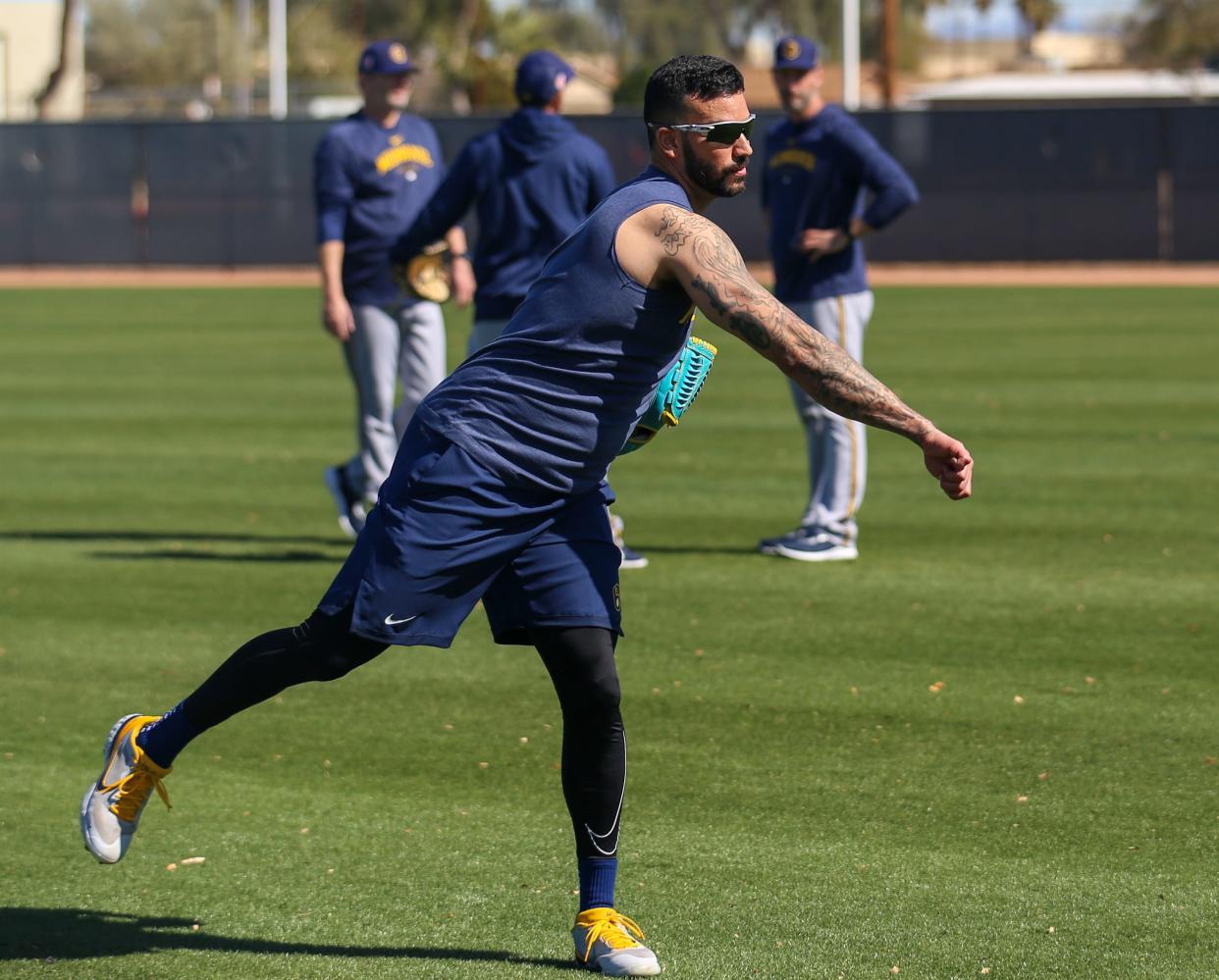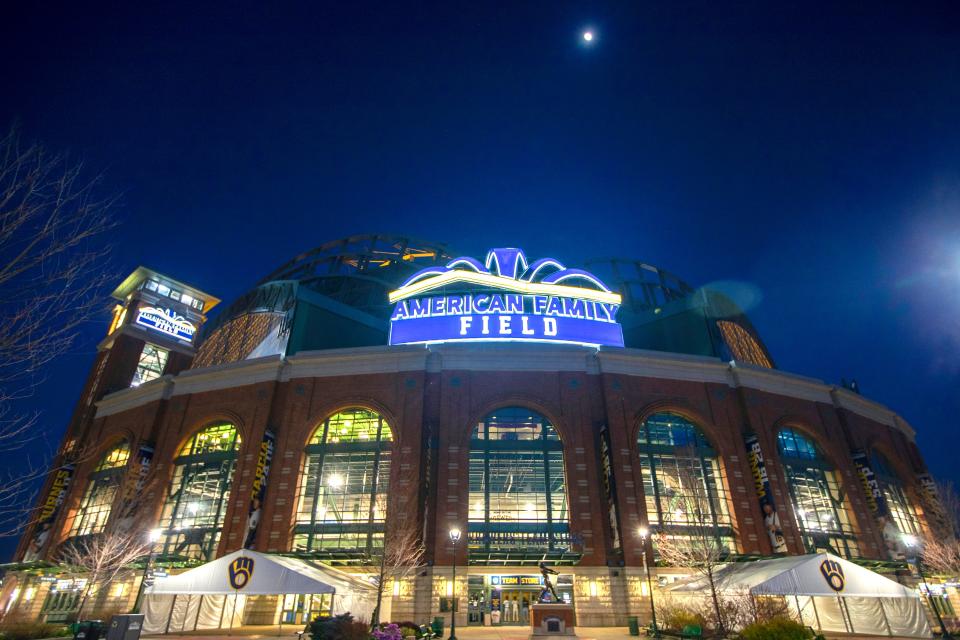Could the Brewers actually try to leave Milwaukee when their lease expires in 2030?

- Oops!Something went wrong.Please try again later.
A deal floated by Governor Tony Evers would grant the Milwaukee Brewers $290 million for stadium upkeep at American Family Field, with one notable condition: The Brewers would need to extend their lease and remain committed to the city another 13 years, through the year 2043.
Principal owner Mark Attanasio hasn’t made any remarks indicating that he’d be willing to take the team elsewhere. The native of New York has remained based in Los Angeles since he purchased the organization in 2004, but he’s a regular attendee at Brewers games and functions and has discussed keeping the organization within his family.
But if the state government is willing to suggest that deal, then surely there are those who feel it’s possible the Brewers would entertain going elsewhere after the stadium lease expires in 2030.
“When a team comes out and asks for money, that can seem a little bit rude,” said J.C. Bradbury, an economist and professor at Kennesaw State in Georgia who has long studied the economic impact of sports and sports stadiums. He pointed to the political fallout that impacts legislators in districts with uncertain pro-sports situations, inspiring politicians to sometimes be even more supportive of pro-sports financing than even the voting public.
“The (Tennessee) Titans have expressed they’re absolutely not going to leave (Nashville), but if you go and sit in metro council meetings, and I’ve personally been to those meetings, they always mention, ‘What if we lose the Titans?’” Bradbury said. “It’s very clear that the teams are orchestrating this behind the scenes, and I don’t mean orchestrating like they’re telling people what to do, but they're suggesting we need to mention this to give you a reason (to offer money).”
Does that mean the Brewers would ponder moving on if they don't get the money from the government? The short answer, of course, is that they could. But there are also many reasons to think they wouldn’t, starting with what seems to be bipartisan support for the idea of doing whatever it takes to keep the Brewers in town.
"It puts Wisconsin on the map in one of the four major sports, so it's important to keep them here," Wisconsin State Senate Majority Leader Devin LeMahieu said in an interview with WTMJ radio. "They're a driving economic impact, especially in the summer in southeast Wisconsin ... we just need to make sure what that number is, how we do it, there needs to be investment from the city, the county, all the details like that."
More:American Family Field needs $448 million in long-term work. Here's how that breaks down.
When was the last time a Major League Baseball franchise relocated?
In 2004, the Montreal Expos were moved to Washington and became the Nationals, resolving a complicated dire financial situation for the franchise. Before that, no MLB team has relocated since 1971 when the Washington Senators became the Texas Rangers.
Since 2000, three NBA teams have changed markets (Vancouver to Memphis, Charlotte to New Orleans, Seattle to Oklahoma City), three NFL teams (St. Louis and San Diego both to Los Angeles, Oakland to Las Vegas) and one NHL team (Atlanta to Winnipeg).
Bradbury pointed out that in many cases, such as Charlotte in the NBA or the 1990s cases of Cleveland and Houston in the NFL, leagues demonstrate their sustained interest in those markets by putting an expansion team in that very same city.

What are the steps to relocation?
Maury Brown of Forbes laid out the steps – and often, the difficulty – in relocating a franchise. MLB’s process includes forming a committee to identify an appropriate market as a destination and garnering 75% approval from the owners for the change of address.
Mindful of protecting their own market footprint, owners wouldn’t just accept any new city. Even when the Expos move to Washington, D.C., gained approval by a 29-1 vote, dissenting vote Peter Angelos (owner of the Baltimore Orioles) threatened to sue the league and worked out a deal to offset losses from a new team encroaching on his market.
There’s another element: MLB has already discussed expansion from 30 to 32 clubs, meaning two more markets would theoretically be off the table for any sort of relocation plan. Not only that, but a new franchise would come with expansion fees, roughly $1 billion dispersed to the 30 clubs, making it the preferred method of engaging a new MLB city.
Major League Baseball, in other words, wants to stay in business where it’s currently in business and will favor a new stadium in the same market before a relocation.
“It’s important to recognize that, but leagues are going to do everything they can to make sure that stadiums are state-of-the-art and will provide an alternative to watching a game from the comfort of your couch, something that can compete with the convenience," said Robert Baade, a professor of economics at Lake Forest College who grew up in Milwaukee and Greenfield and has studied public stadium and event financing since the mid-1980s. “The Brewers can always play the small-market card; so can other small-market clubs. Leagues do understand that, so that accounts for things like revenue sharing.”
Playing in a stadium that opened in 1966, the Oakland Athletics franchise has been heavily linked to Las Vegas and Tampa Bay's issues have involved talk of relocation. The A's and Rays have been among the worst in MLB attendance in the past decade.

Is American Family Field really becoming a sub-standard venue?
By 2030, American Family Field (née Miller Park) will be nearly 30 years old, which perhaps doesn’t feel elderly by stadium standards (especially for one with a retractable roof).
But there are examples of teams leaving younger stadiums. Turner Field in Atlanta was in use from 1997-2016 before the Braves moved to the suburbs and Truist Park. The Texas Rangers opened their new Globe Life Field in 2020 after spending just 25 years at Globe Life Park (1994-2019). The future of Chase Field in Arizona, another building with a retractable roof, is uncertain even though it’s only been in use since 1998. None of the six teams to play with retractable roofs, dating back to 1989 when the Rogers Centre was built in Toronto, has ever moved on to a new stadium.
American Family Field has undergone regular upgrades over the years to stadium amenities and scoreboards.
Is Milwaukee, as a small market, more prone to losing a franchise?
Whether because the Milwaukee Braves left for Atlanta, the Brewers came close to leaving in the 1990s or because Herb Kohl took steps to ensure the Milwaukee Bucks stay in town before he sold the team, it’s hard for Milwaukee fans to dismiss the threat of losing pro sports.
“When the Braves first came to Milwaukee, nobody was able to top that attendance,” Bradbury said. “Think about Milwaukee as a city. There’s an identity and pride to Milwaukee that has survived for a long time. … Milwaukee has a demonstrated history for strong support of baseball; what is MLB going to gain by moving a team somewhere else? If you've got a market that works, it doesn’t make a ton of sense to leave. In the history of teams have left markets, it's when they're doing very poorly in attendance.”
The Brewers, despite being the smallest market in MLB, have consistently finished in the top half in league attendance, even with a small backslide in 2022.
Baade, who remembers his own father’s despondence when the Braves left town, doesn’t outright dismiss the idea that the Brewers could leave, agreeing that a smaller-market team is at a disadvantage.
“Changing demographics and better stadium deals are the things that encourage movement, so of course, the Brewers are going to be shopped around, if not explicitly, certainly, that thought will be in the minds of everyone, which explains why it is that Gov. Evers is thinking, ‘Well I’ve got to do what I can to get the Brewers to commit longer term to Milwaukee.’”
JR Radcliffe can be reached at (262) 361-9141 or jradcliffe@gannett.com. Follow him on Twitter at @JRRadcliffe.
This article originally appeared on Milwaukee Journal Sentinel: Could Brewers really try to leave Milwaukee after 2030 without funds?

